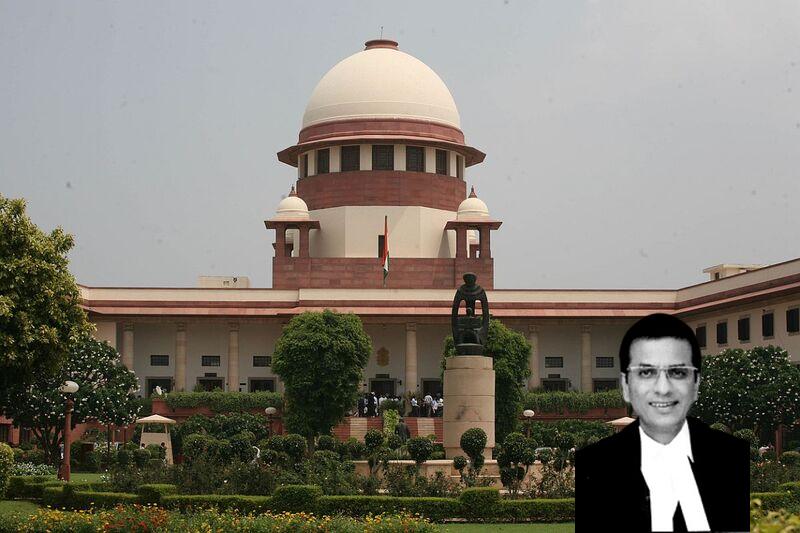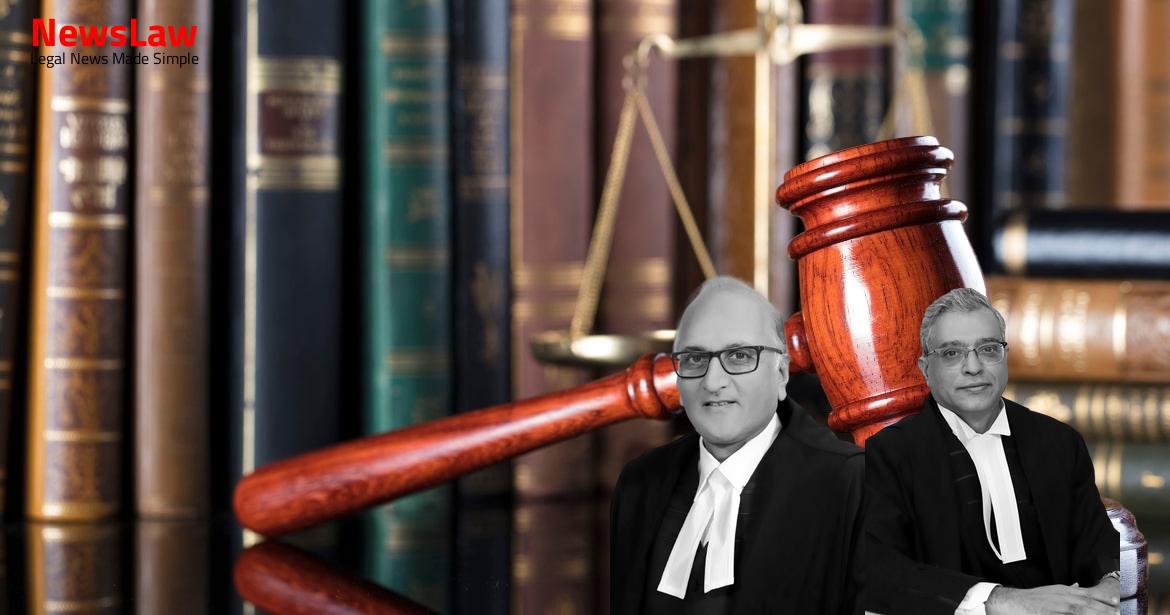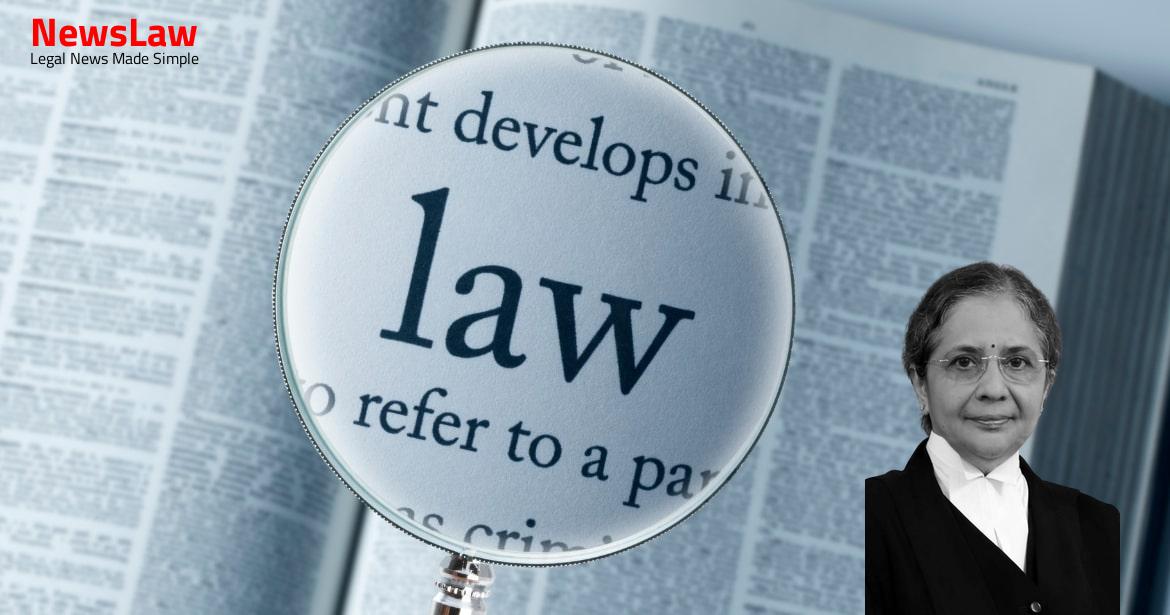Since both the captioned appeals arise from a common judgment and order passed by the High Court dismissing two criminal appeals of two accused persons tried in one sessions case those were heard analogously and are being disposed of by this common judgment and order. for passing order for registration of First Information Report against accused persons, wherein, applicant has mentioned as under that marriage of daughter of applicant Sudha had been solemnized on 12.12.1997 with Balvir Singh son of late Mahavir Singh, resident of village Ratanpur, Kumbhuchau, Halqa-Saneh, Kotdwar, Garhwal at Uttari Jhandichaur, Police Station Kotdwar and out of their wedlock, one son was born to them. Despite reluctance of his daughter, on 09.05.07 Balvir left his son at Kotdwar and forcibly took my daughter Sudha who was in healthy condition to Mangolpuri, Delhi. Page 4 of 42 On calling for the report from Police Station on the application filed by applicant, Police Station has submitted that no First Information Report is lying registered at Police Station on the basis of facts mentioned in the application moved by applicant under section 156(3) Cr.P.C Applicant has filed photocopies of letters written by his daughter and photocopies of applications lodged by him with Inspector Incharge of Police Station Kotdwar and Deputy District Magistrate, Kotdwar in court in support of his application filed under section 156(3) Cr.P.C. Therefore, S.H.O., Police Station Kotdwar is ordered that hiving registered First Information Report in the light of application filed by applicant under section 156(3) Cr.P.C and to conduct investigation. Maheshwari Devi who is the mother of Balvir Singh, in connivance with him, started harassing my daughter in different ways and raising demand of Rupees One lakh cash in dowry. When Balvir Singh and his mother came to know about these letters, then they pressurized my daughter for asking back the said letters and we accordingly returned those letters, but letter dated 20.05.04 which has been lodged by us at Police Station, remained with us.
That on 13.05.07 at about 1.30 o’clock in the night my younger brother Harender Singh received information from Delhi over phone that my daughter Sudha has left for her heavenly abode all of a sudden in Mangolpuri. I had lodged report at Police Station and Deputy District Magistrate also that she has been killed, but no first information report has not been registered till now. Sd/- HC 14 Kabool Singh Police Station Kotdwar Dated : 09.06.07” 5. Post mortem report Exh.Ka-4 b. Two letters written by the deceased to her father i.e., PW1 Exh.Ka-1 and Ka-2. The appellants also examined one Anoop Singh cousin brother of the deceased as a defence witness (DW-2).
The trial court upon appreciation of the oral as well as documentary evidence on the record held the husband guilty of the offence punishable under Section 302 of the IPC and also for causing harassment punishable under Section 498A of the IPC. 10,000/- The mother-in-law, namely, Maheshwari Devi came to be acquitted by the trial court of the offence of murder, however, she stood convicted by the trial court for the Page 9 of 42 offence punishable under Section 498A of the IPC and was sentenced to undergo 212 years of imprisonment. Regarding this, defence examined DW-1 who is deceased’s son and who said in his examination-in-chief that “my mother was undergoing treatment at Delhi, where she died”. DW-1 has only Page 10 of 42 stated that death occurred during treatment, while DW-2 has based his evidence on new facts which are not concurring with the facts of defence because they have said that treatment was given at Escorts Hospital. This witness gave statement in his cross-examination that deceased died at Sanjay Gandhi Memorial Hospital regarding which no document was filed. Victim died on 13.5.2007 and it is said that on 13.5.2007 her last rites were performed, but on receiving the news of death prosecution witness immediately put forward his doubt.
This witness further said “I wrote a letter to Police station to investigate into her death. This witness on receiving information about incident immediately raised suspicion and asked for a postmortem to be carried out. In viscera report FSL has detected poison, in such situation the burden was on accused to prove whether deceased herself consumed poison and whether the deceased was under mental stress due to which she might have consumed poison, but defence did not make any statement of such kind during the whole trial. On the basis of statement given by PW-1, deceased’s death took place at Delhi, where she was living with accused Balvir Singh. Charge under section 498A of Indian Penal Code against accused Balvir Singh and Shrimati Maheshwari Devi is proved beyond doubt. As prosecution could not prove that accused Shrimati Maheshwari Devi was at Delhi with Balvir Singh during the time of deceased’s death and no role of Maheshawari Devi is proved in deceased’s death, therefore no charge under section 302 of Indian Penal Code is proved against Shrimati Maheshwari Devi and therefore, she is fit to be discharged of the above said charge.” 14. No sooner, the death was reported, PW1, looking at the dead body, insisted for an inquest and the same was done. That being an assertion on behalf of A1, it was he, who was required to establish the same by tendering adequate evidence, which he miserably failed.
He will serve out the sentence as awarded by the Court below. Manisha Bhandari, the learned counsel appearing for the appellant vehemently submitted that the trial court as well as the High Court committed a serious error in holding the appellants guilty of the offence as enumerated above. It was also argued that no sooner the deceased passed away than the husband immediately informed the family members of the deceased about her sudden death. The learned counsel submitted that the facts which, the prosecution has so established should be consistent only with the hypothesis of the guilt of the accused that is to say, they should not be explainable on any other hypothesis except that the accused is guilty. It was argued that if the case put forward by the husband is to be accepted then it is to be believed that while something went wrong with Page 17 of 42 the deceased, the husband was very much present because according to the husband he had immediately taken the deceased to the Sanjay Gandhi Hospital.
It is the convict-husband who could be said to be in special knowledge of things that might have transpired at the relevant point of time. Having heard the learned counsel appearing for the parties and having gone through the materials on record, the only question that falls for our consideration is whether the High Court committed any error in passing the impugned judgment and order. It is too much for the convicts to say that the presence of aluminium phosphide in the viscera could be due to the medicines which the deceased used to take for her heart ailment. Though in his further statement, the convict-husband has said that he had informed the family members of the deceased yet the evidence of PW3 Harender Singh (uncle of the deceased) is otherwise. In his oral evidence, PW1 has stated as under: “Balvir Singh took my daughter to Delhi in the year 2007 and left his son here in the village itself. Then, Balvir came to Ratanpur with the dead body of Sudha. There the police prepared the inquest report and I was the panch in the inquest proceedings. Father Saheb, since the time my marriage was solemnized, I have been feeling extremely harassed from the acts of my mother-in-law and husband but I have not told you about this till date thinking that good sense will prevail with passage of time but, both of these intend to eliminate me. They say that if you wish to go then bring Rs. One lakh otherwise you will not be allowed to return here. My father, if you wish to see me happy then please send the letter through Anil uncle. You just send the letter through uncle, as I need that letter and there is no benefit in keeping that letter with you. Burden of proving fact especially within knowledge. — When any fact is especially within the knowledge of any person, the burden of proving that fact is upon him. Section 106 of the Evidence Act referred to above provides that when any fact is especially within the knowledge of any person, the burden of proving that fact is upon him. The ordinary rule that applies to the criminal trials that the onus lies on the prosecution to prove the guilt of the accused is not in any way modified by the rule of facts embodied in Section 106 of the Evidence Act. Page 24 of 42 It is evident that that cannot be the intention & the Privy Council has twice refused to construe this section, as reproduced in certain other Acts outside India, to mean that the burden lies on an accused person to show that he did not commit the crime for which he is tried. When a case is resting on circumstantial evidence, if the accused fails to offer a reasonable explanation in discharge of burden placed on him by virtue of Section 106 of the Evidence Act, such a failure may provide an additional link to the chain of circumstances. When inferring the existence of a fact from other set of proved facts, the court exercises a process of reasoning and reaches a logical conclusion as the most probable position. Vivian Bose, J., had observed that Section 106 of the Evidence Act is designed to meet certain exceptional cases in which it would be impossible for the prosecution to establish certain facts which are particularly within the knowledge of the accused. On the contrary, it is designed to meet certain exceptional cases in which it would be impossible, or at any rate disproportionately difficult for the prosecution to establish facts which are “especially” within the knowledge of the accused and which he could prove without difficulty or inconvenience. Karnail Singh [(2003) 11 SCC 271 : 2004 SCC (Cri) 135].) The law does not enjoin a duty on the prosecution to lead evidence of such character which is almost impossible to be led or at any rate extremely difficult to be led.
Where an offence like murder is committed in secrecy inside a house, the initial burden to establish the case would undoubtedly be upon the prosecution, but the nature and amount of evidence to be led by it to establish the charge cannot be of the same degree as is required in other cases of circumstantial evidence. The question of burden of proof, where some facts are within the personal knowledge of the accused, was examined by this Court in the case of State of W.B. The Sessions Judge, after referring to the law on circumstantial evidence, had observed that there was a missing link in the chain of evidence after the deceased was last seen together with the accused persons, and the discovery of the dead body in the hospital, and concluded that the prosecution had failed to establish the charge of murder against the accused persons beyond any reasonable doubt. Presumption of fact is a rule in law of evidence that a fact otherwise doubtful may be inferred from certain other proved facts. When inferring the existence of a fact from other set of proved facts, the court exercises a process of reasoning and reaches a logical conclusion as the most probable position.
The Page 30 of 42 ordinary rule which applies to criminal trials in this country that the onus lies on the prosecution to prove the guilt of the accused is not in any way modified by the provisions contained in Section 106 of the Evidence Act. Section 106 obviously refers to cases where the guilt of the accused is established on the evidence produced by the prosecution unless the accused is able to prove some other facts especially within his knowledge which would render the evidence of the prosecution nugatory. Glanville Williams: “All that the shifting of the evidential burden does at the final stage of the case is to allow the jury (Court) to take into account the silence of the accused or the absence of satisfactory explanation appearing from his evidence.” 44. Again, when a person does not act with some intention other than that which the character and circumstances of the act suggest, it is not for the prosecution to eliminate all the other possible intentions. Generally, the burden of proof upon any affirmative proposition necessary to be established as the foundation of an issue does not shift, but the burden of evidence or the burden of explanation may shift from one side to the other according to the testimony. Although not legally required to produce evidence on his own behalf, the accused may therefore as a practical matter find it essential to go forward with proof. This does not alter the burden of proof resting upon the prosecution (Wharton’s Criminal Evidence, 12th Edn. ), “prima facie case” means a case established by “prima facie evidence” which in turn means “evi-Ideuce sufficient in law to raise a presumption of fact or establish the fact in question unless rebutted”. In this context we may profitably utilise the legal principle embodied in Section 106 of the Evidence Act which reads as follows: “When any fact is especially within the knowledge of any person, the burden of proving that fact is upon him.” 37. Krishnanand Chaudhary was brutally assaulted and then a chhura-blow was given on the chest. In the absence of an explanation, and considering the fact that the appellants were suspecting the boy to have kidnapped and killed the child of the family of the appellants, it was for the appellants to have explained what they did with him after they took him away.
We take notice of the fact that the appellant-convict (husband) has not explained in any manner as to what had actually happened to his wife more particularly when it is not in dispute that the appellant-convict was in company of his wife i.e., deceased. It is only the appellant-convict who could have explained in what circumstances and in what manner he had taken his wife to the Sanjay Page 37 of 42 Gandhi Hospital and who attended his wife at the hospital. But as stated by this Court: “It is true that in a case of circumstantial evidence not only should the various links in the chain of evidence be clearly established, but the completed chain must be such as to rule out a reasonable likelihood of the innocence of the accused. We consider the true rule to be that Section 106 does not cast any burden upon an accused in a criminal trial, but that, where the accused throws no light at all upon the facts which ought to be especially within his knowledge, and which could support any theory of hypothesis compatible with his innocence, the Court can also consider his failure to adduce any explanation, in consonance with the principle of the passage in Deonandan Mishra (supra), which we have already set forth. State of Madhya Pradesh reported in (2019) 10 SCC 211, wherein this Court after referring to its various other Page 39 of 42 decisions on the applicability of Section 106 of the Evidence Act observed as under: “16. In the said case the trial court had come to the conclusion that, upon the established circumstances listed above, no other inference was left open to the Court except that the appellant and his father and stepmother had conjointly committed the murder of the deceased Smt. Chanda Devi died in the manner alleged by the appellant lay upon the appellant. Both the trial Court and the High Court had rightly pointed out that the appellant had miserably failed to give credible or substantial evidence of any facts or circumstances which could support the pleas that Smt. Learned Counsel for the appellant contended that Section 106 of the Evidence Act could not be called in aid by the prosecution because that section applies only where a fact relating to the actual commission of the offence is within the special knowledge of the accused, such as the circumstances in which or the intention with which an accused did a particular act alleged to constitute an offence.
It is a different matter that the quantum of evidence by which he may succeed in discharging his burden of creating a reasonable belief, that circumstance, absolving him from criminal liability may have existed, is lower Page 41 of 42 than the burden resting upon the prosecution to establish the guilt of an accused beyond reasonable doubt. We also pose the very same question like the one posed in Sawal Das (supra) referred to above, “has the prosecution discharged its initial or general and primary burden of proving the guilt of the appellants beyond reasonable doubt?” 61. ” The role Page 42 of 42 courts in such circumstances assumes greater importance and it is expected that the courts would deal with such cases in a more realistic manner and not allow the criminals to escape on account of procedural technicalities, perfunctory investigation or insignificant lacunas in the evidence as otherwise the criminals would receive encouragement and the victims of crime would be totally discouraged by the crime going unpunished.



